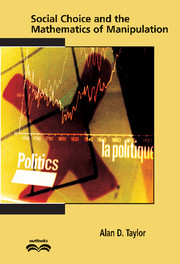5 - Social Choice Functions
Published online by Cambridge University Press: 07 December 2009
Summary
The Barberá–Kelly theorem
Throughout this chapter, V denotes a social choice function. We assume there are three or more alternatives in the set A, and that V is defined for every two-element agenda. Except where mentioned otherwise, we restrict attention to questions of manipulability in the context of linear ballots.
Manipulability of social choice functions was touched on in Section 2.4. The difference between what was done there and what is done here is twofold: Here, we only consider ballot manipulability – not agenda manipulability – and we do not restrict ourselves to resolute procedures.
But this means that we must now confront the same issue that arose in earlier chapters: What does it mean to say “there is a situation in which voter i can secure a better outcome by submitting an insincere ballot?” Aside from revisiting the problem of deriving preferences for sets of alternatives from a voter's ranking of individual alternatives, there is a new aspect of “situation” to be dealt with here, and we begin by dispensing with it.
Suppose, then, that we have a social choice function V that is (ballot) manipulable in some sense. Does this mean that V is manipulable for every agenda v or does it mean that V is manipulable for some agenda v? It is, in fact, the latter notion with which we work, because saying that V is manipulable for every agenda v would mean, in particular, that V is manipulable when v = A, and this puts us back in the context of voting rules – a topic we've finished with for the moment.
- Type
- Chapter
- Information
- Social Choice and the Mathematics of Manipulation , pp. 102 - 117Publisher: Cambridge University PressPrint publication year: 2005
- 1
- Cited by



